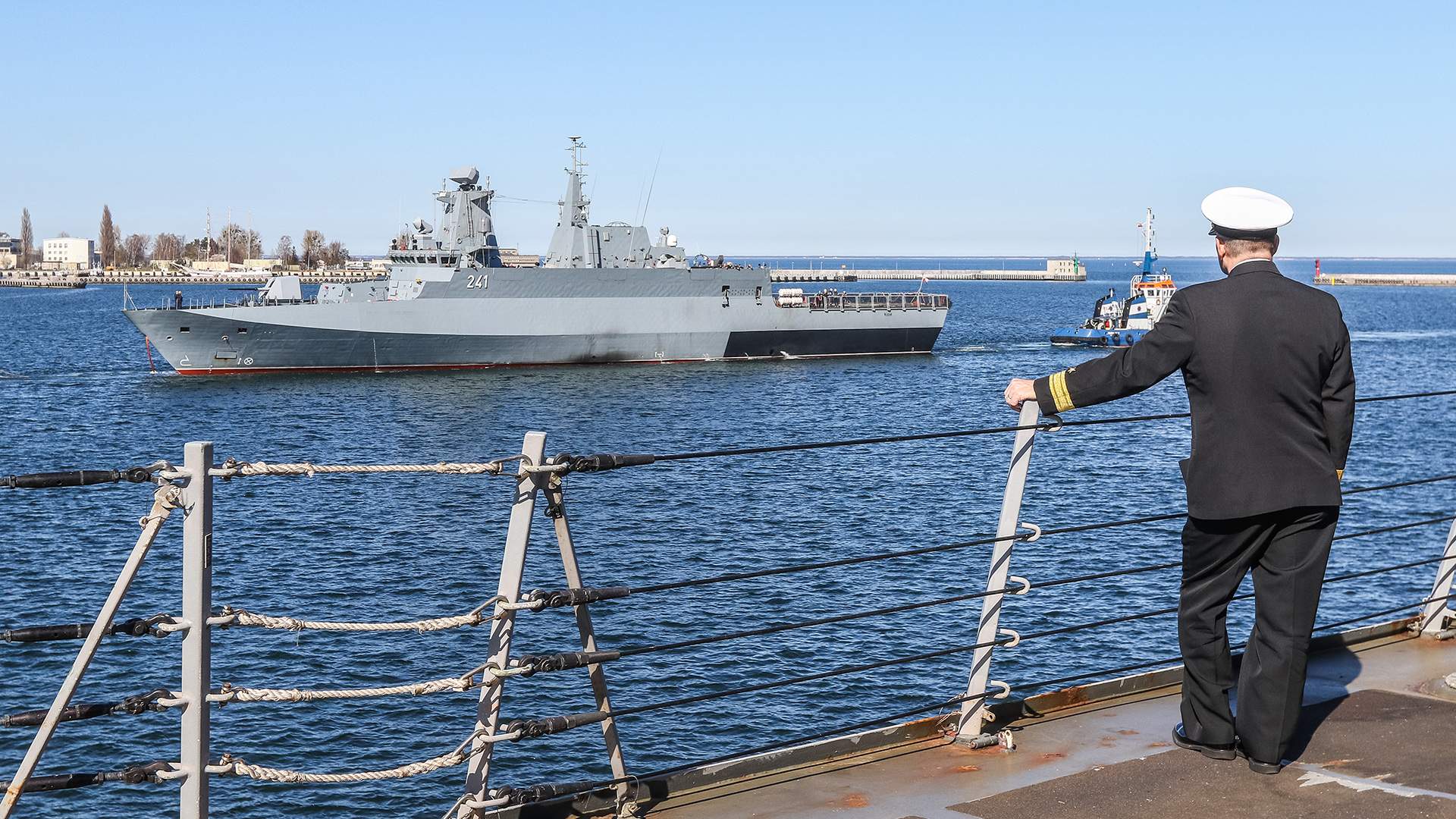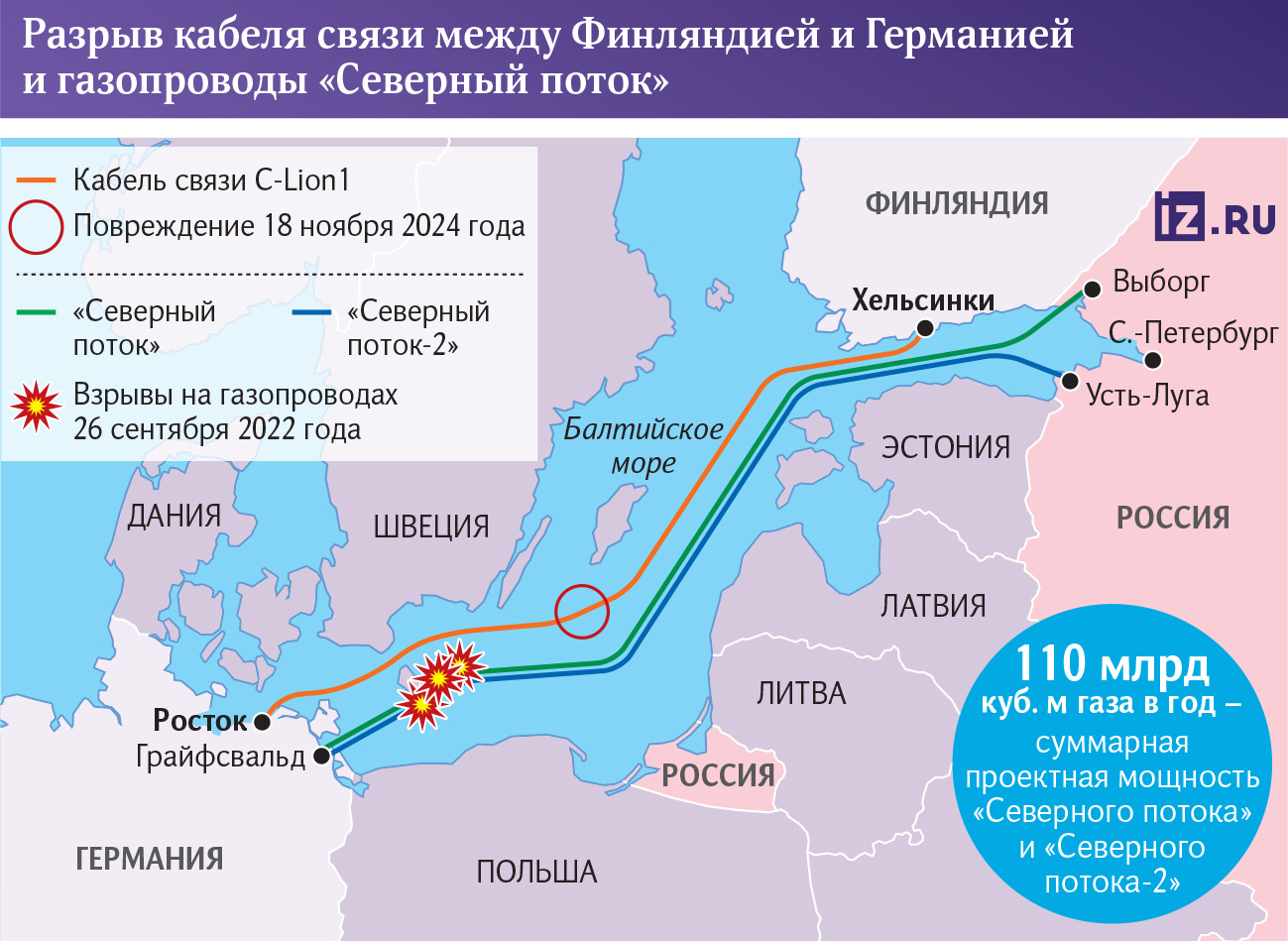Cable weapons: the West is looking for reasons to confront Russia in the Baltics

The West is interested in building up NATO forces and limiting the movement of the Russian fleet in the Baltic Sea. The news that two communication cables at the bottom of the Baltic Sea were damaged as a result of sabotage may become another pretext for this, according to experts interviewed by Izvestiya. On November 11, Russian presidential aide Nikolai Patrushev warned that the United States and Great Britain could disable fiber-optic cables.
Two Internet cables break in the Baltic Sea
Two fiber-optic submarine cables have been damaged in the Baltic Sea over the past two days. The first, a 218-kilometer-long link between Lithuania and the island of Gotland in Sweden, failed on Nov. 17 around 11 a.m. Moscow time, telecommunications company Telia Lietuva said. A second 1,200-kilometer cable between Helsinki and the German port of Rostock stopped working at about 5 a.m. Moscow time on Nov. 18, according to Finnish cybersecurity and telecommunications company Cinia.
German Defense Minister Boris Pistorius said the cable break between Germany and Finland was very likely the result of sabotage. A final formulation will be put forward after an investigation into the incident, he said. The head of the technological department of the Lithuanian company also believes that the incident was not an accident. At the same time, the Western media have already started to disperse the version that Russian Federation is behind the incidents.
It is noteworthy that the incident coincided with the NATO naval exercise Freezing Winds 24, which began on November 18 off the coast of Finland in the northern part of the Baltic Sea and will last until November 29.
This is not the first sabotage in the waters of the Baltic Sea. The most notorious one happened on September 26, 2022, when two strings of the Nord Stream-1 gas pipeline and one of the two strings of Nord Stream-2 were blown up. And shortly before the Nord Stream explosions, the North Atlantic Alliance also conducted exercises. Last October, it was also reported that the Balticconnector gas pipeline connecting Estonia and Finland was damaged. So far, the results of the investigation into the incident have not been officially announced. But the media wrote that the Finnish side assumed that it was accidentally damaged by the anchor of the Chinese ship Newnew Polar Bear. At the same time, there were also reports about a "Russian trace", which Vladimir Putin called "bullshit".

Tigran Meloyan, an analyst at the Center for Mediterranean Studies at the National Research University Higher School of Economics, said the assumptions of sabotage may serve as a pretext for deploying more NATO forces in the region.
- The news that two communication cables were damaged at the bottom of the Baltic Sea as a result of an alleged sabotage will obviously serve as another pretext for further build-up of the alliance's forces in one of the hotspots between Russia and NATO in the Baltic-Black Sea arc. It is the Baltic region that is seen as the theater with the highest level of tension after Ukraine in relations with Russia," Tigran Meloyan told Izvestia.
It is not excluded that Western countries will blame Moscow for the damage of the submarine cables. It is not the first year that the Northern states have been accusing Russia and, less frequently, China of "hybrid attacks" in order to put pressure on their leadership and population, said Nikita Lipunov, an analyst at the Institute of International Studies of the Moscow State Institute of International Relations of the Moscow State Institute of International Relations of the Russian Foreign Ministry.
- Such "attacks" are allegedly carried out against critical infrastructure, especially underwater infrastructure. It is quite difficult to identify the culprit in such situations, and Western countries use every information occasion to hint at Russia's involvement. In this way, they justify the need to strengthen their military presence there, including under the auspices of NATO, which only increases military and political tension," Nikita Lipunov told Izvestia.
Earlier, the Russian side voiced concerns that Washington and London may try to disable offshore fiber-optic cables, including to promote their own economic interests. "According to available information, the Americans and the British consider sabotage on the Nord Streams as one of many methods of promoting their economic interests. New infrastructure facilities, including offshore fiber-optic cables that provide communications around the world, may come under their attack," Nikolai Patrushev, Russian presidential aide and chairman of the Maritime Board, said Nov. 11.
What other Western countries are interested in
NATO countries are interested in building up their military presence in the Baltic region. In particular, Helsinki and Tallinn are hatching plans to limit the movement of the Russian fleet in the Baltic Sea waters. "Closing the Gulf of Finland strategically depends on the security situation. If danger arises and it is necessary, we are ready to do it in order to protect ourselves," Andrus Merilo, commander of the Estonian defense forces, for example, said this September.
After NATO expanded to include Finland and Sweden, the alliance began to promote the narrative that the Baltic Sea had allegedly become the military bloc's "internal body of water," says Nikita Lipunov.
- Of course, the alliance's position in the Baltic has been seriously strengthened, especially in terms of maritime intelligence, but this is an incorrect statement of the issue, which completely ignores the Russian presence and interests in the region. By promoting such a thesis, NATO countries seek to strengthen their position in the eyes of their public and partners outside the bloc, creating the illusion of effective deterrence of Russia in the Scandinavian-Baltic area," he continued.
Moreover, the countries of the region are discussing the possibility of limiting the Russian Navy's activity in the Baltic or blocking its access to the world's oceans altogether. In the summer, Denmark even considered options to ban Russian ships from passing through the straits connecting the Baltic and North Seas. Nevertheless, any restrictive measures against the Russian fleet in the Baltic are unlawful and in case of a complete blockade may even serve as a casus belli, so Western countries limit themselves to rhetorical interventions here, the expert summarized.
The countries that have critical maritime infrastructure in the region and direct access to the Baltic Sea are more interested in restricting the movement of the Russian fleet in the Baltic Sea. First of all, we are talking about Finland, Sweden, Germany and Estonia, emphasized Tigran Meloyan. Among the main objects of concern are the Balticconnector gas pipeline, which supplies natural gas from Finland to Estonia, and the Estlink 1 and Estlink 2 cables, which transmit electricity between the two countries. It is also significant that this year Estonia and Finland signed a memorandum of cooperation on the protection of submarine infrastructure against the backdrop of the challenges faced by European countries after the Nord Stream pipeline was blown up, he summarized.
- But the West will not dare to directly use warships to block the Russian fleet, as it will automatically mean casus belli, but they will continue to look for the most sophisticated methods to cause maximum inconvenience to Russia," Tigran Meloyan noted.
Among such methods one can single out the ongoing sanctions pressure and hunting for the so-called Russian shadow fleet, as well as legal elaboration of the issue of Estonia and Finland expanding their territorial waters in order to turn the Gulf of Finland into an even narrower "throat". As for blocking Russian oil and LNG tankers passing through Danish waters or the English Channel, such a topic is on the agenda today, but it exists only in the information field, the expert said.
After Finland and Sweden joined NATO, the desire to change the status quo in the Baltic Sea area became more and more evident. European countries have begun to work out options for revising the current legal regimes of the sea straits used for shipping. Contrary to international rules, Russian ships are periodically disconnected from the satellite communication network, which creates security threats. Sanctions pressure is also actively used. NATO naval patrols have been significantly increased. Earlier, the NATO military bloc also instructed Tallinn to start preparations for a potential armed conflict with Russia. In September, a new military base was opened in southern Estonia, which is located on the border with Russia. It was named Reedo and consists of 14 buildings designed for 1,000 servicemen. The number of exercises taking place in the region has also increased significantly.
According to Tigran Meloyan, NATO continues to adapt to the current realities and is taking all necessary steps for this purpose: from the establishment of the Maritime Center for the security of critical underwater infrastructure to the scenario of invoking Article 5 of the NATO charter during the Northern Coast naval exercises held in the coastal areas of Latvia and Estonia in September 2023.
How Russia should respond
The Baltic Sea is governed by the high seas rule, so no one has the right to ban Russia from sailing there, former Baltic Fleet Commander Vladimir Valuyev told Izvestia. According to Sergei Avakyants, former commander of the Talnakh Concentration Fleet and director of the Institute of Military Economics and Strategy, an attempt to blockade Russia in the Gulf of Finland or to blockade the Kaliningrad region would mean war. And lifting this blockade will be decided by military means, he told Izvestia.
On November 19, Russian President Vladimir Putin signed a decree approving an updated nuclear doctrine - the Fundamentals of State Policy in the field of nuclear deterrence. According to the document, "actions of a potential adversary aimed at isolating a part of the Russian Federation's territory, including blocking access to vital transportation communications," are considered grounds for nuclear deterrence. Tigran Meloyan believes that the doctrine may serve as a signal to NATO countries wishing to revise the legal regime in the Baltic region and prevent transit communication with the Kaliningrad region. Indeed, more specificity in such documents narrows the field of maneuverability for Western countries, namely, it warns of Moscow's decisive actions that may follow in case of continuation of aggressive anti-Russian policy affecting the key national interests of the Russian Federation.
Переведено сервисом «Яндекс Переводчик»







